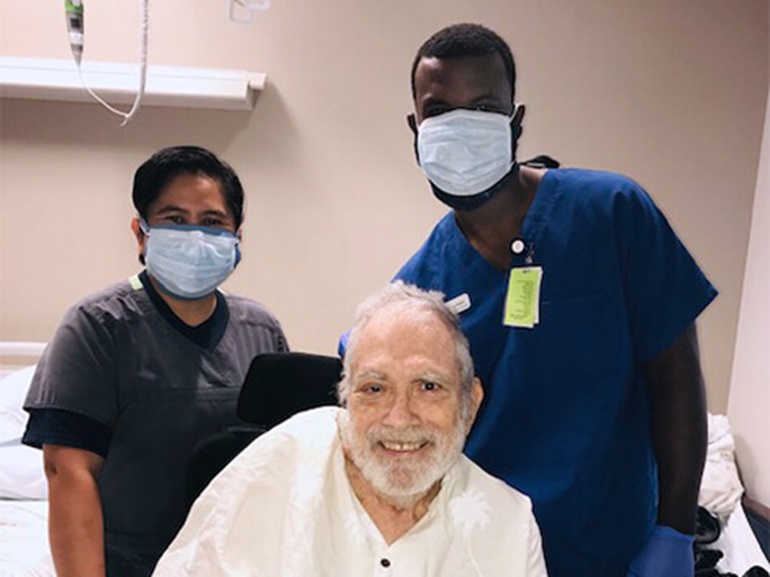James' Story*

James Hogan is a 75-year old retired electrical engineer who loves spending his free time outdoors and enjoys boating, fishing and camping. He and his wife also enjoy participating in agility competitions with their golden retriever.
At the end of February, James went to UF Health Shands Hospital for an orthopedic oncology evaluation, as he had previously been diagnosed with multiple myeloma, a cancer that forms in a type of white blood cell called a plasma cell. Multiple myeloma causes cancer cells to accumulate in the bone marrow, where they crowd out healthy blood cells. James had been home from the hospital for only a day when he got out of bed in the middle of the night to use the bathroom and fell, fracturing both his left leg and left arm. Fractured bones are common in people with multiple myeloma, and James was no exception.
He was transported to the closest hospital and then transferred to UF Health Shands Hospital, where James underwent two procedures to treat his fractures. About a week later, while recovering from surgery, James fractured his right upper arm and had to have yet another operation. He spent a week in the ICU after his three procedures.
James was admitted to UF Health Rehabilitation Hospital in mid-March, choosing the facility as he had rehabbed there in 2016 after a broken leg and was very happy with his experience. After his multiple surgeries, James lost his ability to do things that he was previously able to do for himself; since both of his arms and one of his legs were fractured, he was unable to eat, bathe, brush his teeth or use the restroom independently. James’ goals were to be able to stand up and walk again, as well as being able to spend quality time with his family. James also teased the staff that he “wants to run a marathon!”
A key turning in point in James’ recovery was the first day he was able to stand with assistance during physical therapy. Physical therapy was a major challenge for James, especially when he was working on walking between the parallel bars. He was initially nervous about using them due to the fact that he had two broken arms, but he acknowledged how important they were to getting him up and moving again. At the end of James’ time at UF Health Rehabilitation Hospital, he was showing significant improvement in becoming more independent in his self-care activities. He was able with assistance to transfer in and out of his power wheelchair and he can self- operate his chair for independent mobility. By the time he was discharged, James was also beginning to show improvements in short distance walking and planned to continue his recovery at an outpatient rehabilitation center. His immediate plans were to go home and enjoy a “ribeye steak with a side of ribs.”
James is full of appreciation for those who helped him during his recovery, particularly his wife, who has been a great moral support and participated in care partner training to learn how to assist him when he gets home. One of James’ therapists stated that they referred to him as "The Hulk," a reference to Hulk Hogan's “never say never” attitude. The therapist continued by saying “James is so in love with his wife, who is his rock, and whenever he felt like he was faltering, I would say her name and his strength would return. His wife dotes on him and supports him in every way she can. Their relationship is the definition of a power team.”
When James talked about his treatment team, he said “They’re all great people, very professional and helpful. I don’t have enough praise for what they’ve helped me accomplish. The physical and occupational therapists, doctors and nurses have been friendly and encouraging. They feel like an extended family and we’ll miss them. The therapy team really encourages you and pushes you to meet your full potential.”
James said that he learned a lot during his journey of recovery at UF Health Rehabilitation Hospital, stating that “You have to take things as they are. It does not help to complain and it’s good to keep a positive attitude.” His advice to individuals going through recovery is to “be nice to the people who care for you because they only want to see you get better. Be ready to do the work; you can’t expect it to just happen. You have to stay positive and have a good sense of humor.”